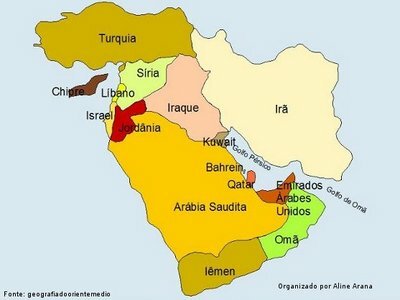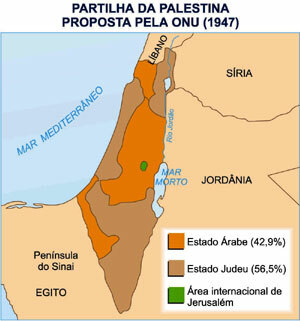It is common for us to turn on our television and see some news about attacks, bombings or other types of conflict in the region, we even think that peace between the peoples who live there is something impossible to achieve. achieved.
Two characters are at the center of these disagreements: Israel and Palestine, the rivalry between them is millenary, being narrated since biblical times and crossing the centuries. Authorities around the world have already committed themselves to brokering a truce between those involved, but peace agreements seem to be far from materializing.
see more
Scientists use technology to unlock secrets in ancient Egyptian art…
Archaeologists discover stunning Bronze Age tombs in…
In the historical period known as Old age, O Roman Empire dominated an extensive strip of land that extrapolated the European continent. The region known as the Middle East stretching from the Mediterranean Sea to India was also hit by Roman expansionism.

But, one of the provinces in the region refused to be submitted to the power of the most powerful empire, starting a rebellion that would change the history of the people involved.
Judea was dominated by the power of the Romans, known for being the cradle of Christianity and the birthplace of Jesus Christ, the province led a rebellion against the rule of the Roman Empire, which triggered a strong repression against its inhabitants.
The Jewish rebellion against the rule of the Roman Empire triggered an invasion led by General Titus in the year 70. The violence of the invaders caused the destruction of Jewish temples and the expulsion of these peoples to other regions such as Asia, Europe and North Africa.
The episode became known as diaspora and was responsible for the second dispersion of the Jewish people, the first occurring when King Nebuchadnezzar destroyed Jerusalem and sent its inhabitants to Babylon.
The second Diaspora did not end with the expulsion of the inhabitants of Judea, the Romans not satisfied with this fact, they began to persecute the Jews and to fight their religion, which was based on worship in a single God.
The persecution against this people was intensified in the fourth century when Emperor Constantine converted to Christianity. Jews were accused of being the murderers of Jesus Christ, which led to their marginalization and exclusion within the European continent.
Historically, Jews have suffered persecution in different periods, it is worth remembering that in the first decades of the 20th century, the head of the German nation, Adolf Hitler, undertook a great hunting and killing of Jews based on his fanciful theory known as the theory of the Aryan race, which culminated in one of the greatest massacres in history known as Holocaust.
See too: Anne Frank: a victim of the Holocaust
The dispersion of Jews across various regions of the world made them become a cosmopolitan people, which influenced and absorbed customs and cultural practices from the places they passed through.
Despite settling in other locations, the Jews never abandoned the desire to return to their homeland. In the 20th century, they started an intense migratory wave to Palestine, which through a succession of facts generated the need for the creation of a Jewish state.
Plans to gather Jews in their own state, Israel, come from the 19th century, this intention became known as Zionism. The expression derives from the word Zion, the name of one of the mountains located on the outskirts of Jerusalem.
The creation of a State that would shelter the Jewish population ran up against the resistance of the Arabs who had been settled there since the 7th century. The agreements for the division of Palestinian territory between Arabs and Jews intensified the discord between these peoples, which was already old due to religious issues.
With the end of First World War the British came to dominate the region of Palestine, and together with the allied countries, it demonstrated a favorable opinion to the creation of a Jewish State.
The control of Palestine by the British motivated the migration of Jews to the region. The intense migration displeased the Arabs, starting a series of conflicts involving the two peoples.
With the persecution suffered by the Jews during the Second World War and the barbarities committed against these peoples in the concentration and extermination camps, the UN determined the division of the territory for the creation of two independent states: Israel It is Palestine. The measure aimed, in addition to other factors, at historically apologizing to the Jews.

The division of Palestinian territory was poorly received by its inhabitants and by the Arab peoples neighboring Palestine. The negative reaction of these peoples to the creation of a Jewish State within the Arab territory triggered several conflicts that extend to the present day.
Among the reasons for the misunderstandings are disputes over territories considered sacred by both peoples. The episode resulted in the first Arab-Israeli war, which ended in Israeli victory. Israel has the aid and support from the United States in resolving differences with the Arabs.
With the end of the first war between Jews and Arabs, many Palestinians abandoned their homes and went to live in regions not controlled by Israel. The episode resulted in an increase in the number of Palestinian refugees in Arab countries neighboring Palestine.
In order to try to solve the Palestinian question, in 1964 the PLO-Organization for the Liberation of Palestine. The PLO was led by Yasser Arafat and had as its objective the struggle for the affirmation of Palestinian sovereignty. Arafat became the main leader of the Palestinians in the fight against the State of Israel.
Various agreements such as Camp David and the Oslo Accord were signed in an attempt to establish peace in the Middle East, but despite efforts, conflicts still continue to make the territory unstable, turning the region into a “powder keg” about to explode.
Lorena Castro Alves
Graduated in History and Pedagogy